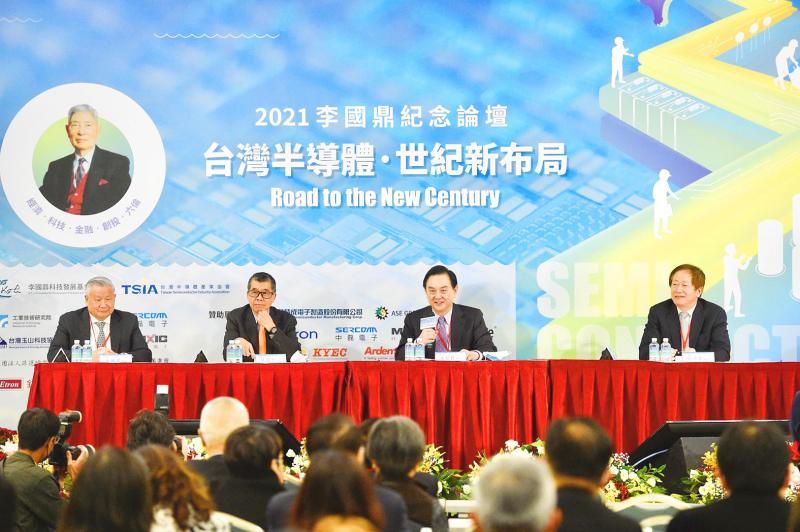Contract chipmaker Taiwan Semiconductor Manufacturing Co (TSMC, 台積電) and integrated circuit designer MediaTek Inc (聯發科) are optimistic about the “metaverse” concept, expecting it to create major opportunities for the semiconductor industry.
At a tech forum last week to commemorate former finance minister K.T. Lee (李國鼎), who has been dubbed the father of Taiwan’s economic miracle and who helped build Taiwan’s semiconductor sector in the second half of the 20th century, TSMC chairman Mark Liu (劉德音) said he expects the metaverse to grow quickly in the next decade.
Over the next 10 years, data computing power and transmission speeds are forecast to increase significantly, paving the way for a combined real and virtual world, Liu said.

Photo: George Tsorng, Taipei Times
TSMC has been developing the technologies needed for metaverse applications, he added.
The metaverse concept has been promoted by Facebook Inc chief executive officer Mark Zuckerberg since July. It refers to a digital world where people can move between devices and communicate in a virtual environment.
Liu said hardware for the metaverse concept has been in development for years, leading to the belief that augmented reality (AR) devices could replace smartphones and virtual reality (VR) gadgets could replace personal computers.
The main problem is how to make AR and VR headsets more affordable and lighter with a longer battery life, Liu said, adding that the headsets “have to be improved 100-fold” if they are to become as popular as smartphones.
MediaTek chairman Tsai Ming-kai (蔡明介) said the AR and VR device market is forecast to be worth US$500 billion by 2040, and the applications for devices to be used in the metaverse would be a main target of the semiconductor industry.
The market for these applications, which would be used while working, socializing, gaming, buying goods or making financial transactions, could grow to US$8.3 trillion, Tsai said.
The metaverse concept is expected to prompt more suppliers to develop VR and AR devices, Taipei-based market information advisory firm TrendForce Corp (集邦科技) said.
It forecast that shipments of VR and AR devices would hit 12.02 million units next year, up 26.4 percent from a year earlier.
TrendForce said the smart manufacturing market resulting from the metaverse concept is expected to top US$540 billion in 2025.
Other Taiwanese semiconductor suppliers such as Novatek Microelectronics Corp (聯詠科技), which supplies driver ICs for flat panels, and Phison Electronics Corp (群聯電子), a memory control IC maker, also appeared upbeat about metaverse applications.

Application-specific integrated circuit designer Faraday Technology Corp (智原) yesterday said that although revenue this quarter would decline 30 percent from last quarter, it retained its full-year forecast of revenue growth of 100 percent. The company attributed the quarterly drop to a slowdown in customers’ production of chips using Faraday’s advanced packaging technology. The company is still confident about its revenue growth this year, given its strong “design-win” — or the projects it won to help customers design their chips, Faraday president Steve Wang (王國雍) told an online earnings conference. “The design-win this year is better than we expected. We believe we will win

Intel Corp chief executive officer Lip-Bu Tan (陳立武) is expected to meet with Taiwanese suppliers next month in conjunction with the opening of the Computex Taipei trade show, supply chain sources said on Monday. The visit, the first for Tan to Taiwan since assuming his new post last month, would be aimed at enhancing Intel’s ties with suppliers in Taiwan as he attempts to help turn around the struggling US chipmaker, the sources said. Tan is to hold a banquet to celebrate Intel’s 40-year presence in Taiwan before Computex opens on May 20 and invite dozens of Taiwanese suppliers to exchange views

Chizuko Kimura has become the first female sushi chef in the world to win a Michelin star, fulfilling a promise she made to her dying husband to continue his legacy. The 54-year-old Japanese chef regained the Michelin star her late husband, Shunei Kimura, won three years ago for their Sushi Shunei restaurant in Paris. For Shunei Kimura, the star was a dream come true. However, the joy was short-lived. He died from cancer just three months later in June 2022. He was 65. The following year, the restaurant in the heart of Montmartre lost its star rating. Chizuko Kimura insisted that the new star is still down

While China’s leaders use their economic and political might to fight US President Donald Trump’s trade war “to the end,” its army of social media soldiers are embarking on a more humorous campaign online. Trump’s tariff blitz has seen Washington and Beijing impose eye-watering duties on imports from the other, fanning a standoff between the economic superpowers that has sparked global recession fears and sent markets into a tailspin. Trump says his policy is a response to years of being “ripped off” by other countries and aims to bring manufacturing to the US, forcing companies to employ US workers. However, China’s online warriors